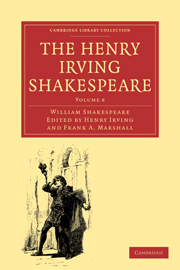Book contents
- Frontmatter
- Prefatory Note
- Contents
- GENERAL INTRODUCTION AND LIFE OF SHAKESPEARE
- Errata
- HAMLET, PRINCE OF DENMARK
- KING HENEY VIII
- PERICLES, PRINCE OF TYRE
- POEMS
- VENUS AND ADONIS
- THE RAPE OF LUCRECE
- SONNETS
- A LOVER'S COMPLAINT
- THE PASSIONATE PILGRIM
- THE PHŒNIX AND THE TURTLE
- INDEX OF SUBJECTS TREATED IN THE NOTES
VENUS AND ADONIS
Published online by Cambridge University Press: 29 August 2010
- Frontmatter
- Prefatory Note
- Contents
- GENERAL INTRODUCTION AND LIFE OF SHAKESPEARE
- Errata
- HAMLET, PRINCE OF DENMARK
- KING HENEY VIII
- PERICLES, PRINCE OF TYRE
- POEMS
- VENUS AND ADONIS
- THE RAPE OF LUCRECE
- SONNETS
- A LOVER'S COMPLAINT
- THE PASSIONATE PILGRIM
- THE PHŒNIX AND THE TURTLE
- INDEX OF SUBJECTS TREATED IN THE NOTES
Summary
CRITICAL REMARKS ON VENUS AND ADONIS AND THE RAPE OF LUCRECE.
It is natural to criticise Venus and Adonis and Lucrece together. The poems have much in common, with much that brings them into very direct and striking contrast. Each is obviously the work of a young poet: from merely reading through the poems, without the aid of external testimony, we could with very considerable certainty assign to them an early date in the long list of Shakespeare's works. They have all the characteristic qualities of youthful work–careless ease and vigour of style, over-laden elaboration of colour and artistic effect, over-accentuated treatment of somewhat sensuous scenes. Venus and Adonis and Lucrece are connected by their theme. That theme is not a particularly pleasant one. It is love, or rather lust: the poet throws all his power of workmanship into representing the keenness and invincibility of a sensual passion that knows no restraint of moral instinct or conventional decorum. But, whereas Lucrece is intensely didactic, Venus and Adonis is no less intensely non-moral; not immoral, but unmoral. If Lucrece gives us the “criticism of life” theory of literature at its keenest, Venus and Adonis shows us the “art for art's sake” doctrine in the furthest possible development of that idea.
Venus and Adonis is the purest paganism, a deification of erotic impulse which Catullus himself could not have surpassed.
- Type
- Chapter
- Information
- The Henry Irving Shakespeare , pp. 339 - 364Publisher: Cambridge University PressPrint publication year: 2009First published in: 1890

